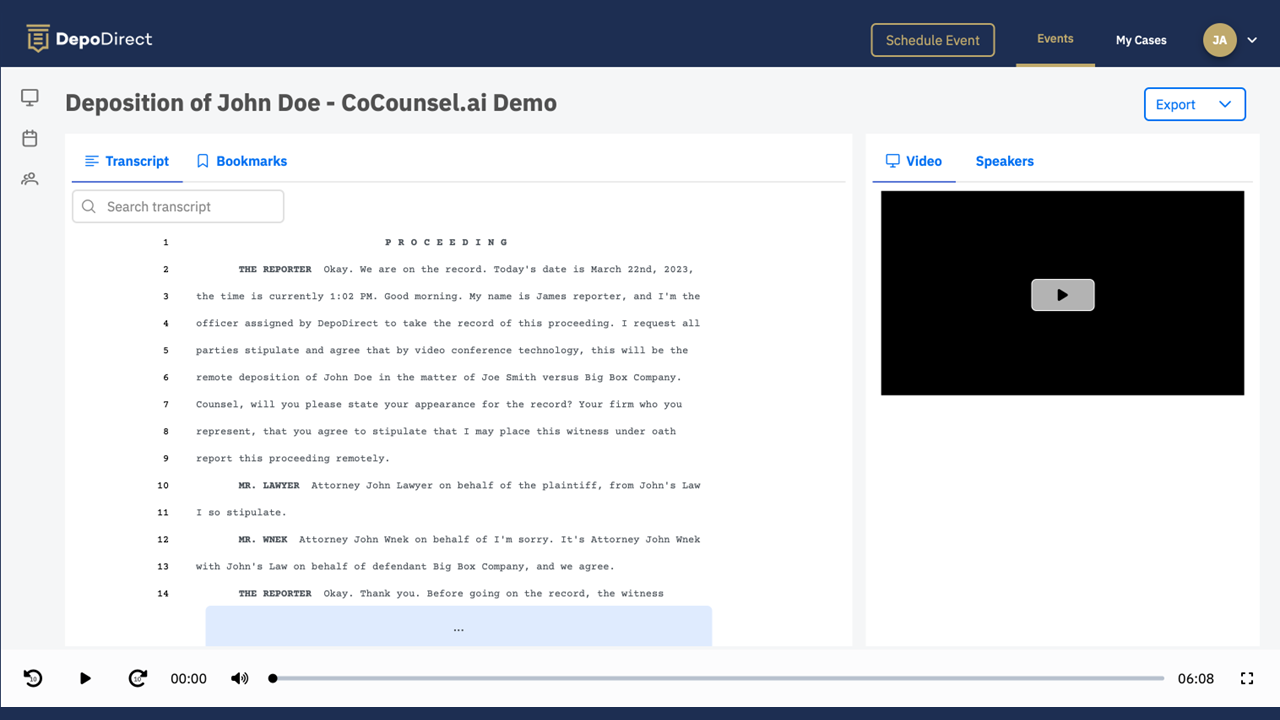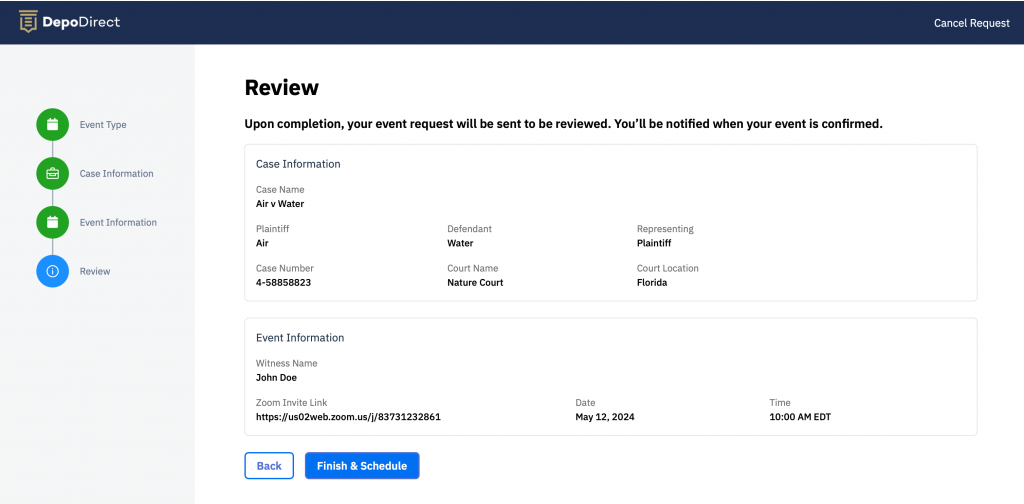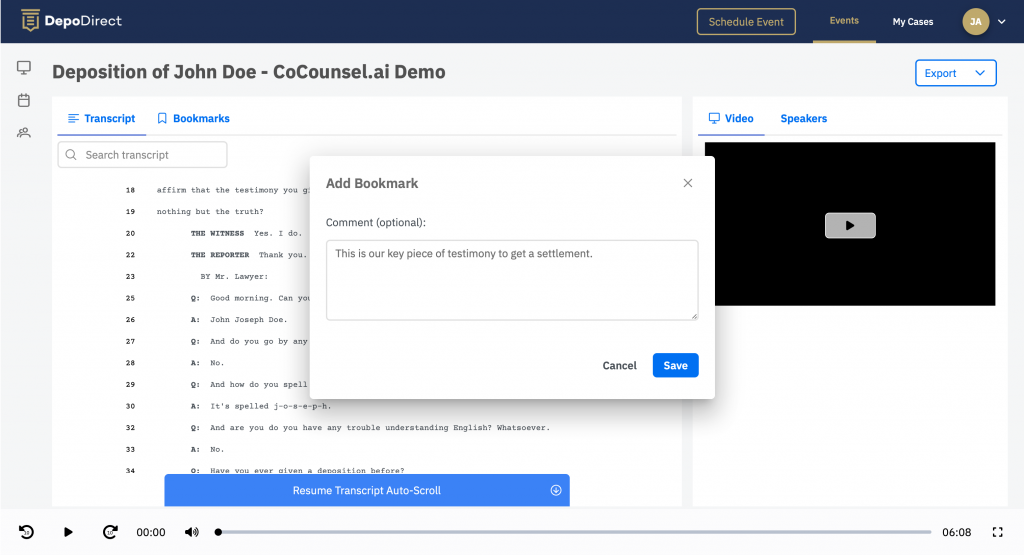You may have noticed of late that many of your video meetings have an unfamiliar attendee — a meeting bot, invited by one of the human participants, that produces a recording or transcript when the meeting is over. But while there are several such products on the market, none have been developed to meet the specific needs of legal professionals.
That changes today with the beta launch of CoCounsel.ai, the first legally nuanced meeting bot. It can join a legal event such as a deposition, hearing or arbitration, and it uses legal-specific AI speech-to-text to provide a legally formatted, highly accurate real-time transcript, along with features such as bookmarking, tagging and archiving.
“CoCounsel.ai is poised to become an indispensable asset for legal professionals, effectively replacing more costly, traditional analog stenographic real-time services,” the company says. “With AI speech-to-text technology that delivers legally formatted and highly accurate transcripts, attorneys can now take control of their depositions more efficiently than ever before.”
CoCounsel.ai was developed by DepoDirect, a legal technology company that provides AI-powered solutions designed to support attorneys in capturing and managing deposition materials efficiently and affordably. Before today’s launch, I was given a demonstration of it by Todd Seligman, CEO; Michael Cantrell, head of product; Rob Cucurull, director of business development; and John Wnek, head of engineering.
Legal Nuances
While other industries have meeting bots of their own, the nuances of depositions and other proceedings require a bot specifically tailored to the legal industry, Seligman told me.
“CoCounsel.ai marks the first legally based meeting bot that can join a legal event such as a deposition, hearing or arbitration, and provide a legally formatted real-time transcript, bookmarking, and an archive of all transcripts and recordings in one place to collaborate with an attorney’s entire litigation team in real time,” he said.
While the company says that CoCounsel.ai’s AI-generated transcripts and recordings are not meant to be the official record of a deposition or other proceeding, they can provide an easy and lower-cost alternative to analog stenographic real time services such as LiveNote, with the added benefits of a digital collaboration platform and archive.
Here is a video:
That means that, in a deposition, CoCounsel.ai is most useful for the attorneys representing the deponent, rather than for the attorneys taking the deposition. By removing the need for a human stenographer to provide real-time transcription in a legal setting, it offers cost savings from lower real-time page rates, no setup fees, and no hidden charges for additional connections or stenographic services.
“Often, the opposing counsel doesn’t have a say in which court reporting agency is used, so they cannot know if there will be a real time stenographer available that can provide a live transcription,” Cantrell said. “With CoCounsel.ai, an opposing counsel can capture the recording for themselves and get the benefits of a legally formatted rough transcript for their firm.”
Two states allow non-noticing attorneys to bring their own recording equipment to a deposition and another 33 states allow it with prior notice, the company says. The other 15 states allow it with a stipulation.
How It Works
The attorney using CoCounsel.ai can schedule it in advance to attend a Zoom meeting or invite it on the fly. For attorneys, that means that they do not have to go through a court-reporting agency to set up the real-time transcription but can set it up directly on their own.
Once active in the meeting, CoCounsel.ai generates a live transcription, delineating the speakers, recognizing when the participants are in colloquy or engaging in question and answer, and formatting appropriately.
At any point, the attorney can add a bookmark and comment to save along with the transcription. A speaker tab allows the attorney to edit information about each of the speakers and their roles (such as witness, attorney or reporter). The transcript is also fully searchable.
As they demonstrated the product for me, I was able to see the real-time transcription of our call, and it appeared to be highly accurate. The company is accurate 90% or more of the time, at up to half the cost of traditional stenographic real time services.
After the event is concluded, the platform provides a same-day post-event viewer of the legally formatted rough transcript, synchronized to the video and audio, so it can be used by attorneys in preparing their cases or for other depositions.

In the post-event viewer, the text and audio are synced.
Future plans for the product include adding the ability for others on the lawyer’s team to remotely watch the real-time transcription and also to watch and listen to video and audio of the proceeding.
The company also plans to launch generative AI features that will combine the live transcript with exhibits and other documents related to the litigation, all to provide a foundational base for querying and searching and, down the road, possibly even for sentiment analysis.
Although CoCounsel.ai has been developed by the remote deposition company DepoDirect, it is offered as a standalone product, with no requirement that customers be users of other DepoDirect products.
The product is currently being offered in a closed beta. Anyone interested in participating in the beta can sign up for the waitlist on the company’s website.
While the company has not set final pricing, Seligman said it will be priced on a SaaS model and in a way that is appealing to smaller firms and that allows pass-through billing of costs to clients. There are no set-up fees or per-hookup charges.
 Robert Ambrogi Blog
Robert Ambrogi Blog

